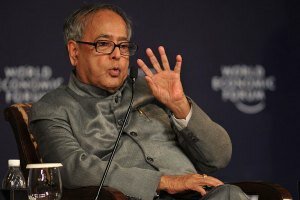Harsher punishment for rapists as president approves new anti-rape laws

While the ordinance ensures that the new laws are in effect, the parliament must pass the bill before April 4, 2013 to ensure that the ordinance does not lapse. If the ordinance lapses, then the new laws will not be valid any more.
Under the new law, the rapist could be subject to death penalty if the violence against a woman leads to her death.
The president has given his assent to the ordinance on stricter anti-rape laws just two days after the Union cabinet passes it.
The landmark rule comes just under two months after the 23-year-old Delhi student ‘Nirbhaya’ was brutally gang-raped on a private bus in Delhi. The student was injured with an iron rod and suffered severe intestinal injuries that led to her death on December 29, 2012.
The shocking incident caused widespread outrage amongst Indians who called on the government to tighten anti-rape laws.
Under the old law, despite the severity of the violence, the punishment for rape was a seven to ten year sentence. Under the new laws, the minimum sentence has been doubled to 20 years.
The new anti-rape laws also state that in case of the death of a victim or if the violence against a woman leaves her in a vegetative state, the punishment will be a death penalty.
In India, death penalty or capital punishment is imposed only in the “rarest of the rare” cases. The last time, the government imposed the death penalty was in August 2012 on Ajmal Kasab, the Pakistani national involved in the 2008 terrorist attack in Mumbai which killed 166 people and injured nearly 300.
More like this
The harsher anti-rape law is the result of a government-approved panel’s review of laws on sex crimes.
The panel also called on the government to set up a fast track court for faster trials. The six accused in the Nirbhaya case, included a minor who will be tried in juvenile court. The other five accused pleaded not guilty to charges of rape and murder on Saturday, February 2.
While many have welcomed the new, tougher anti-rape law, some women groups are saying it is not enough to deter sexual crimes against women in India.
Most read
- 2017: Full list of Indian States, capitals and their Chief Ministers; Nitish Kumar quits and takes oath again as Bihar CM!
- Ram Nath Kovind is 14th Indian President after Pranab Mukherjee. Here's a list of all Indian Presidents since 1950
- List of all the major rivers of India: Names, Origin and Length
- Indian cabinet 2017: Full list of Ministers and their portfolios in Narendra Modi government
- Indian Independence Day Celebrations 2017: 71st Independence Day at London's The Bhavan on Aug 3; Not at Osterley Indian Gymkhana
- Dosa recipe: How to make crispy Paper Dosa and Masala Dosa
- Watch Delhi bride Amisha Bhardwaj’s funky wedding dance video that is now globally viral
- Sony SAB TV is first Hindi entertainment channel to be available on Freeview in the UK
- Recipe: Misal Pav – how to make missal masala, usal and tarri
- Bollywood Dream Team 2016: Katrina, Alia, Sidharth, Varun, Parineeti, Aditya Roy Kapur US tour in August
India News Bulletin by email
More Lead Stories
- 2017: Full list of Indian States, capitals and their Chief Ministers; Nitish Kumar quits and takes oath again as Bihar CM!
- Indian train meals not protected from rats, cockroaches, dust, insects, warn auditors
- IIFA 2017 New York Pics: Bollywood stars ooze glamour at the green carpet
- Paris Couture Week Pics: Sonam Kapoor charms like a princess in bridal wear
- London Grenfell Tower Fire – Key facts and pics












